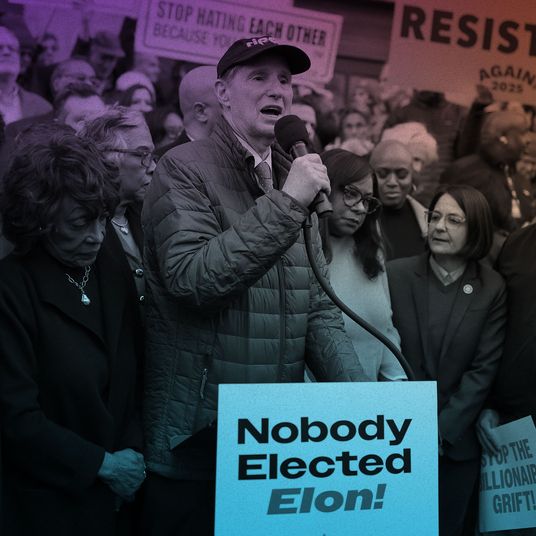One of the most contentious questions in American political thought over the past half-dozen years has been whether Donald Trump represents a departure from the ideals of American conservatism or, alternatively, its apotheosis. The departure interpretation is put forth mainly by conservatives, who see Trump’s bigotry and authoritarianism as a betrayal of their noble creed. The apotheosis interpretation is largely advocated by conservatism’s critics, who see those traits as mainly consistent with its traditional embrace of isolationism, McCarthyism, and segregation.
The neoconservative editor and author Norman Podhoretz has given an interview to the Wall Street Journal editorial page that centers directly on this dispute. Podhoretz, who is not only an esteemed right-wing intellectual but a living link to its formative period in the middle of the 20th century, weighs in forcefully on the side of apotheosis.
To be clear, Podhoretz is not a critic of Trump’s. Quite the contrary: He has come to see his own life’s work as leading directly to the political style embodied by the 45th president. “I was, to begin with, anti-anti-Trump,” Podhoretz explains. “I was not crazy about the guy. I had never met him, and still I’ve never met him. But I thought the animosity against him was way out of proportion and, on the right, a big mistake. I went from anti-anti-Trump to pro-Trump.”
Podhoretz’s interview is remarkably clear about the fact that he was attracted to Trump not despite the candidate’s racism, nationalism, and authoritarianism but precisely because of those qualities.
On the subject of race, this slightly cagey exchange between Podhoretz and his interviewer manages to be highly revealing:
In the Army in 1953–55, he wrote in that book, “usually my closest friends were back-country Southern boys, real rednecks.” (As a Southern redneck myself, I marked the passage in pencil many years ago.) “They’re sane,” he says to me. “They know there’s something wrong, let’s say, when a guy says he’s a girl. They look at that and say, What are you, f— crazy?” He waves as if to suggest this is only one among many instances of insanity. “All that stuff.”
Podhoretz is boasting that he identified with the social views of white southern men a decade prior to the passage of the Civil Rights Act. When asked to elaborate on their alleged good sense, he offers up “when a guy says he’s a girl,” but transgender rights was not a big public issue in the 1950s.
What was a big social-rights issue on which white Southerners would have blunt views that struck Podhoretz as sane? Well … you know. The interviewer tactfully declines to probe further.
Podhoretz explains that his central reason for leaving the left for the right was the left’s failure to appreciate America’s goodness: “‘I broke with the left mainly because of its anti-Americanism’ … He pauses, leans back in his sofa chair, and restates the formulation. ‘A force for good in the world — or not?’”
Amazingly, the Journal’s interviewer does not point out how utterly diametrical this sentiment is with Trump’s stated foreign-policy views. Neocons like Podhoretz have spent decades accusing Democrats of advocating “moral relativism” between the United States and dictatorial regimes, but Trump is the first president in the history of the United States to actually espouse it. When asked to defend his admiration of a Russian regime that murders journalists, Trump shot back, “There are a lot of killers. You think our country’s so innocent?” His main foreign-policy belief is that the United States should act purely out of self-interest, including by committing war crimes (as defined by the U.S. military) and using military power to plunder weaker countries.
This is the opposite of serving as “a force for good in the world.” But it reveals that goodness was never the standard Podhoretz had used to judge American foreign policy at all. He merely resented any criticism of American military power and believed the country should not have to meet any ethical standard in its dealings with other countries.
The aspect of Trumpism that Podhoretz sees most clearly is Trump’s refusal to abide by the fair elections he loses, the rule of law, or other democratic niceties. Like many conservatives, Podhoretz sees these qualities as evidence that Trump grasps the existential stakes of domestic political conflict.
“It’s a war, in my view,” Podhoretz says. “Many people are reluctant to see it in those terms. I mean, people say it’s a lot like 1858 and so on, but I don’t see it as a prelude to a civil war and 600,000 Americans dead. That’s not my meaning. But spiritually it’s a war.” Asked if the division within the right is between Republicans who see domestic politics in such stark terms and those who don’t, Podhoretz agrees: “I think Trump was the only guy who understood the situation in those terms, whether by instinct or whatever.”
Prompted to comment on what the interviewer delicately describes as “Trump’s behavior after the 2020 election,” Podhoretz waves it off, stating only that he regrets that it might have cost the party a Senate election: “Maybe Trump’s outlived his usefulness, I don’t know. And the way he gave away Georgia” — he means the two January 5 runoff elections that cost the Republicans the Senate majority — “was pretty hard to forgive. But if I thought he could win, I wouldn’t hesitate to vote for him.”
The crimes of January 6 don’t seem to bother Podhoretz at all. Only January 5 would be “hard to forgive,” and that’s because it hurt the party. He is perfectly copacetic with Trump’s attacks on the system itself as long as they advance the sole objective of protecting right-wing power, an end that justifies any means.
Podhoretz hardly represents all of neoconservatism; to the contrary, the neocons seem to be the faction of conservative intellectuals most resistant to Trumpism. But Podhoretz is making clear in his advanced age that his elegant-sounding arguments for abandoning the left were largely a cover for a deeper collection of ugly resentments. Trump is a perfect moral X-ray, and Podhoretz is one of many figures this era has revealed for what they always were.





























